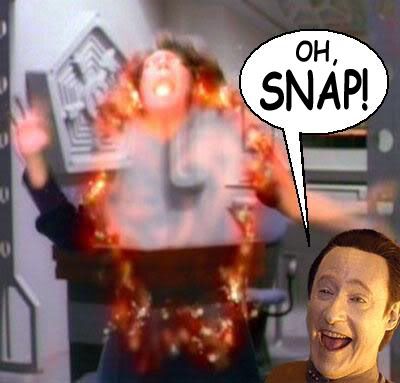Fajo's proximity device prevents anyone from touching him and it can be used as a weapon. If Data does not fire then Fajo can charge at him and knock him down and then confiscate the distruptor. Data is unable to use the escape pod because the hanger door is shut and even if he did escape, Fajo's ship could easily destroy his pod or lock onto it. It is also important to remember that Data believes that the Enterprise is convinced that he is dead. Data has two choices: surrender to Fajo or kill him.
The Next Generation teaches that all life forms have a right to life, Fajo represents one of the most violent challenges to that philosophy in the series. Data has the opportunity to end Fajo's tyranny, and an opportunity that may never come again. Data chooses to overcome his moral code for the sake of achieving something necessary. It is an unenviable position but, for what it's worth, I agree with his decision.
I posted that I thought that Data lying to Riker was shocking to me but it is not really when you consider what happened in The Measure of a Man and The Offspring. In the first episode Starfleet wished to make a law that Data was their property and they could dismantle him and in the next one they went after his daughter. Data must have believed that Starfleet would exploit any pretext to get the chance to dissasemble him and that killing Fajo could qualify as one. In Clues in Season 4, an episode about Data lying, Picard tells Data that Starfleet will have him stripped down to his wires because of his apparent insubordination. In Measure of a Man, Data tells Maddox that he cannot submit to his procedure because he is the culmination of Dr Soong's dream and if he dies something unique and wonderful will be lost. Data lies to his commanding officer in order to protect himself.
Riker knew he was lying, he could have ordered an investigation into this alleged transporter malfunction - after all if phasers were to suddenly discharge during transportation that would be disastrous for away missions. But Riker recognised Data as a comrade, a brother, he knew he was lying but he also knew that he had a reason.
Excellent analysis.


